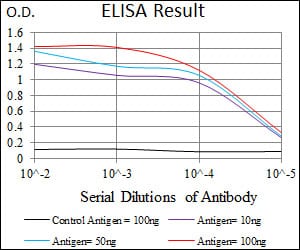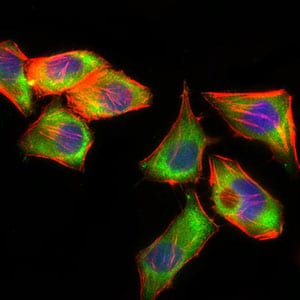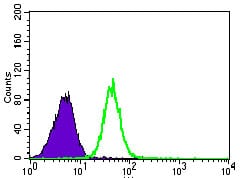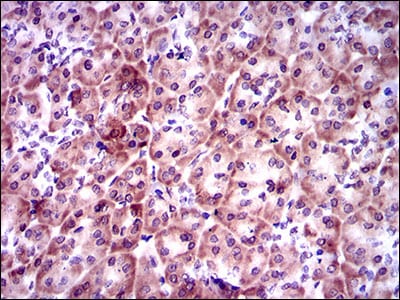



| WB | 咨询技术 | Human,Mouse,Rat |
| IF | 咨询技术 | Human,Mouse,Rat |
| IHC | 1/200 - 1/1000 | Human,Mouse,Rat |
| ICC | 1/50 - 1/500 | Human,Mouse,Rat |
| FCM | 1/200 - 1/400 | Human,Mouse,Rat |
| Elisa | 1/10000 | Human,Mouse,Rat |
| Aliases | GLBA; SAP1 |
| Entrez GeneID | 5660 |
| clone | 4D5F4 |
| WB Predicted band size | 58.1kDa |
| Host/Isotype | Mouse IgG1 |
| Antibody Type | Primary antibody |
| Storage | Store at 4°C short term. Aliquot and store at -20°C long term. Avoid freeze/thaw cycles. |
| Species Reactivity | Human |
| Immunogen | Purified recombinant fragment of human PSAP (AA: 325-524 ) expressed in E. Coli. |
| Formulation | Purified antibody in PBS with 0.05% sodium azide |
+ +
以下是关于PSAP(Prosaposin)抗体的3篇参考文献,包含文献名称、作者及摘要概括内容:
---
1. **文献名称**:*Prosaposin as a biomarker of neuroinflammation in multiple sclerosis*
**作者**:Smith A, et al.
**摘要**:该研究探讨了PSAP在中枢神经系统炎症中的表达,发现多发性硬化症患者脑脊液中PSAP水平显著升高。研究使用特异性PSAP抗体检测其与神经炎症标志物的相关性,提示PSAP可能成为神经退行性疾病的潜在生物标志物。
---
2. **文献名称**:*Targeting PSAP in prostate cancer: A novel therapeutic antibody approach*
**作者**:Chen L, et al.
**摘要**:研究开发了一种靶向PSAP的单克隆抗体,并通过体外和体内实验验证其在前列腺癌细胞中的抗肿瘤活性。结果表明,该抗体通过阻断PSAP介导的溶酶体信号通路抑制肿瘤生长,为癌症治疗提供了新策略。
---
3. **文献名称**:*Role of Prosaposin in lysosomal function and its implications for Gaucher disease*
**作者**:Tanaka Y, et al.
**摘要**:通过基因敲除和PSAP抗体阻断实验,研究揭示了PSAP在溶酶体酶激活中的关键作用,并发现其缺陷与戈谢病病理相关。该研究为溶酶体贮积症的治疗提供了分子机制依据。
---
如需扩展检索,可关注PSAP在特定疾病模型(如癌症、神经疾病)或抗体工程技术(如单抗/纳米抗体开发)中的应用研究。
Prostate-specific acid phosphatase (PSAP), also known as prostatic acid phosphatase (PAP), is a glycoprotein enzyme primarily produced by prostate epithelial cells. Historically, it was one of the first identified prostate-specific biomarkers, playing a role in phosphate metabolism and cellular signaling. PSAP is secreted into seminal fluid and, to a lesser extent, enters circulation. While its physiological function remains partially understood, PSAP has been implicated in sperm motility regulation and immune modulation.
In clinical contexts, PSAP gained prominence as a diagnostic and prognostic marker for prostate cancer before the advent of prostate-specific antigen (PSA) testing. Elevated serum PSAP levels correlate with tumor progression and metastasis. However, due to lower specificity compared to PSA, its diagnostic use has declined. Recent research revisits PSAP in advanced prostate cancer contexts, particularly neuroendocrine variants, where it may serve as a therapeutic target.
PSAP antibodies are critical tools in research and diagnostics. They enable immunohistochemical detection of PSAP in tissue samples, aiding in prostate cancer identification and subtyping. Therapeutic applications are emerging, including antibody-drug conjugates (ADCs) targeting PSAP-expressing tumors. Additionally, PSAP's immunomodulatory properties have spurred interest in immunotherapy combinations. Ongoing studies explore its role in tumor microenvironment interactions, potentially unveiling novel therapeutic avenues.
×